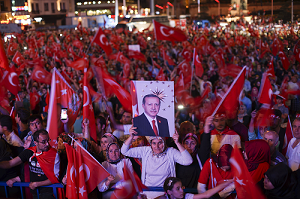The Turkish Referendum that Was Not
by Halil Gürhanlı
April 28, 2017
There was, arguably, hardly any point in Turkey’s April 16 referendum. Despite all the hype within the “yes” and “no” camps, both of which considered it as the most important vote ever to be cast in the country’s history, the referendum was never going to yield any major change in practical terms regardless of its result. However, the regime needed a seal of approval, without which it would have been impossible to keep acting as if it has even minimal democratic legitimacy. The referendum also served to further polarize and consolidate the bipolar hegemony in Turkish politics around the figure of President Erdoğan.

Ticking Clocks: Erdoğan and Turkey’s Constitutional Referendum
By Gareth H. Jenkins
March 31, 2017
Whatever the outcome, the Turkish constitutional referendum on April 16 will not resolve the country’s chronic domestic instability, heal its deepening social divisions, revive its flagging economy or end its growing international isolation. But it will shape both the nature of the further turbulence to come and the duration of what is already the final stage of the Erdoğan era.

Turkey Today: A Democracy without Opposition
By Burak Bilgehan Özpek
February 28, 2017
The AKP regime has from the very beginning of its rule successfully deployed the tactic of defaming and delegitimizing opposition. But the tactic has ultimately been successful because those who have successively been targeted by the AKP – seculars, liberals, the left, Kurds – have also held each other’s demands or opposition to be illegitimate. Turkey’s democracy is thus crippled not only because the opposition has been defamed and even criminalized all along since the beginning of the AKP regime. It is the divisions in society that make authoritarianism possible.

Is the Kemalist Project to Blame for Turkey’s Failed Democracy?
By Toni Alaranta
February 17, 2017
It has become a commonplace to argue that Kemalism was a Turkish variant of right-wing nationalism with strong corporatist leanings and even fascist aspects. This is often compounded with the assertion that the Kemalist secularist state elite only sought to secure its own power and status in society, and that it only paid lip-service to Enlightenment ideals. It is pertinent to ask why the Kemalists would have embarked on a hugely unpopular project of culture revolution that threatened their hold on power by provoking a popular reaction, if they only sought to establish a right-wing dictatorship. The right-wing authoritarianism from which Turkey has suffered during most of its history has other sources.

Can “Constitutional Engineering” Once Again Succeed in Pacifying Turkey?
By Halil Karaveli
February 3, 2017
Historically in Turkey, there is a relationship between the rise of emancipation movements and “constitutional engineering”, between class- or ethnic-based challenges to the established order and the imposition of authoritarian constitutional arrangements in response. The authoritarian constitution of 1982 was the answer to the challenge of workers and peasants in the 1960s and 1970s. Today, a presidential system is supposed to neutralize the Kurdish challenge. However, it may be that Turkey’s ethnic fissure may prevent it from developing either democracy or stable authoritarian rule.







